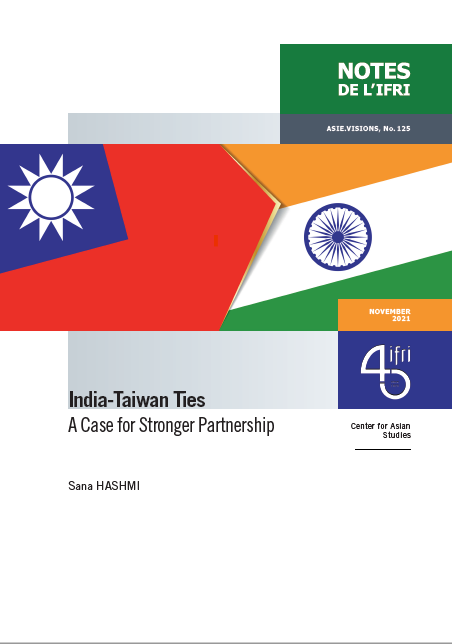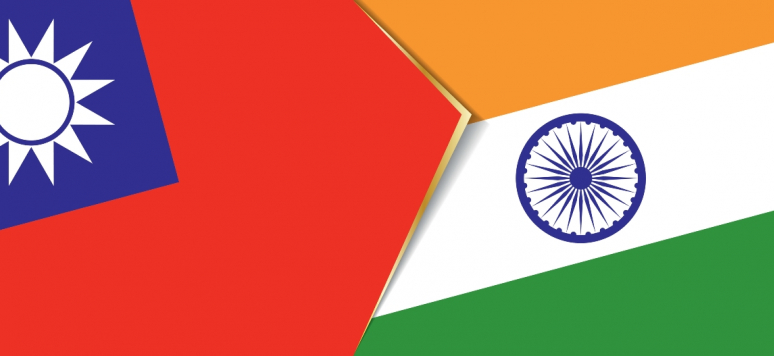India-Taiwan Ties: A Case for Stronger Partnership

The links between India and Taiwan have gathered unprecedented momentum in recent years. This has largely come about due to growing support for Taiwan at civil society level in India.

Taiwan has tried to reach out to India. Its carefully crafted New Southbound Policy, President Tsai Ing-wen’s flagship foreign policy move, which was officially launched in 2016, has served as a roadmap for greater engagement with Taiwan’s potential friends and partners – especially India. India’s Act East policy and Indo-Pacific outreach efforts have also encouraged Taiwan to widen and deepen its engagement with India. This, however, is a recent development facilitated by a variety of strategic developments in the region. With the Indo-Pacific construct taking a firmer shape, New Delhi-Taipei ties are poised to assume a more concrete shape and provide a meaningful role for the bilateral relations, which have ebbed and flowed since the establishment of unofficial relations between the two democracies in 1995.
For a long time, the China factor has overshadowed India-Taiwan relations. While Taiwan itself was taking a conciliatory stance toward China before Tsai assumed the president’s office in 2016, India’s complicated relationship with China also played a role in preventing Delhi and Taipei from intensifying their relationship. However, China’s assertive foreign policy under President Xi Jinping has compelled several countries to find a long-term and viable solution to address their national concerns. China’s reluctance to address India’s territorial concerns and two major Chinese territorial incursions over the past four years (Doklam 2017, Galwan 2020) have forced India to rethink its China policy. In the process, India-Taiwan ties have also benefitted, and India is making efforts to revamp its Taiwan policy. The early signs of this were visible during the initial phase of the first term of the Narendra Modi government (2014–17).
There are noticeable signs of India slowly shedding its hesitancy about Taiwan, but it still remains cautious. To step up the momentum, Taiwan needs to maximize the potential of the New Southbound Policy in engaging India and other major actors in the Indo-Pacific region. Given that India is a key focus country within the framework of the New Southbound Policy, Taiwan should take further steps to strengthen relations with the South Asian country. This partnership is mutually beneficial in several aspects. It will be a missed opportunity for both Taiwan and India if the two sides do not find a way to engage each other purposefully.

Available in:
Regions and themes
ISBN / ISSN
Share
Download the full analysis
This page contains only a summary of our work. If you would like to have access to all the information from our research on the subject, you can download the full version in PDF format.
India-Taiwan Ties: A Case for Stronger Partnership
Related centers and programs
Discover our other research centers and programsFind out more
Discover all our analysesJapan’s Takaichi Landslide: A New Face of Power
Prime Minister Sanae Takaichi has turned her exceptional popularity into a historic political victory. The snap elections of February 8 delivered an overwhelming majority for the Liberal Democratic Party (LDP), driven by strong support from young voters, drawn to her iconoclastic and dynamic image, and from conservative voters reassured by her vision of national assertiveness. This popularity lays the foundation for an ambitious strategy on both the domestic and international fronts.
The U.S. Policy Toward Taiwan Beyond Donald Trump: Mapping the American Stakeholders of U.S.-Taiwan Relations
Donald Trump’s return to the White House reintroduced acute uncertainty into the security commitment of the United States (U.S.) to Taiwan. Unlike President Joe Biden, who repeatedly stated the determination to defend Taiwan, President Trump refrains from commenting on the hypothetical U.S. response in the context of a cross-Strait crisis.

China’s Strategy Toward Pacific Island countries: Countering Taiwan and Western Influence
Over the past decade, China has deployed a diplomatic strategy toward the Pacific Island Countries (PICs). This strategy pursues two main objectives: countering Taiwan's diplomatic influence in the region and countering the influence of liberal democracies in what Beijing refers to as the "Global South."

Opening up the G7 to South Korea to Address Contemporary Global Challenges
The G7’s global influence has diminished as powers like China reshape international governance through initiatives such as BRICS and the Shanghai Cooperation Organisation (SCO). With the G7 now representing just 10 per cent of the world’s population and 28 per cent of global GDP, its relevance is increasingly questioned.








